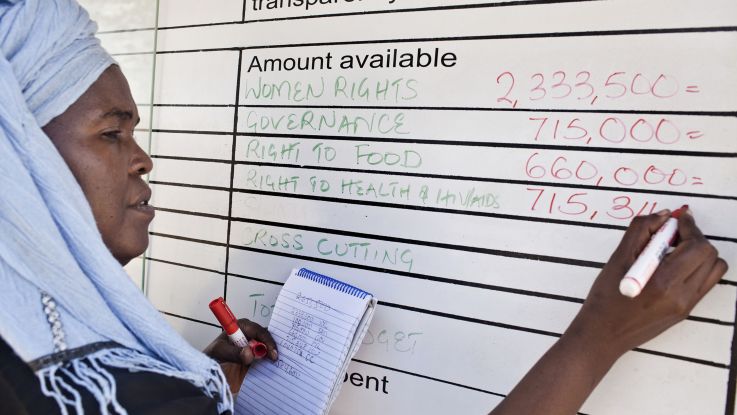How we practise feminism at work
1. Self-awareness
Working towards accepting our vulnerabilities, as well as recognising and valuing our own strengths and those of others.
For example, in all learning events and during one to ones we encourage feedback and self-reflection as a way of learning about ourselves.
2. Self-care and caring for others
Taking care of our own emotional and physical well-being and encouraging and supporting others to do the same.
For example, we make sure deadlines and work schedules take into account unpaid care obligations, taking extra steps to protect women, in particular, from an excessive, dual burden of work and unpaid care. We ensure that leaders, in particular, role model this by keeping their own working hours balanced and taking enough leave.
3. Dismantling bias
Checking our own and institutional privilege and power based on advantages we have such as gender, class, race, ability and other factors.
For example, if we see or experience any discriminatory policies and processes at work, we call them out and we change them. Policies could include maternity and paternity leave, safeguarding, well-being, and others that ought to take into account the reality of all of our lives. We also think about who might be dominating in a discussion and instead encourage others to voice their opinions.
4. Inclusion
Building diverse teams and responding to different barriers to participation.
For example, we include everyone - junior or senior - in the hiring process. This allows us to have diverse interview panels and bring a range of views and life experiences to the table. We work to ensure that people with different perspectives join the conversation at the start rather than relying on those ‘who think like us’.
5. Sharing power
Creating a space for others to lead.
For example, we encourage colleagues to recognise their own value and abilities, and support them in putting themselves forward for committees, promotions and other opportunities. We also encourage individuals who have completed a piece of work to attend senior leadership team meetings to present it.
6. Responsible and transparent use of power
Being clear, timely and transparent in making decisions.
For example, we explain the arguments and analysis that were undertaken to reach decisions and show how people's views were considered in the decision-making process.
7. Accountable collaboration
Ensuring collective goals are clearly defined and mutually owned. Holding ourselves and others accountable for achieving them.
For example, when things don’t go well, we encourage creative thinking about what we could have done differently and how we could have worked together better to overcome challenges. We also recognise and celebrate collective and individual contributions and achievements by putting our team members in the limelight.
8. Respectful feedback
Seeking, giving and valuing constructive feedback as an opportunity for two-way learning.
For example, we practise continuous feedback sideways to our colleagues, bottom up to our managers and top down to those we manage, through empathetic, unbiased and uplifting language. We step into the other person’s shoes and focus on the positive outcomes that we want.
9. Courage
Taking initiative, learning from mistakes and not fearing failure.
For example, we seek out new ways of doing things and empower others to do the same. We are open to valuable insights from colleagues, even those we disagree with. If we come across challenges, we are open about our mistakes and self-doubts. We understand that this is a journey and that everyone will ‘make mistakes’, so our focus is on helping individuals learn about themselves and the impact of their actions.
10. Zero tolerance
Calling out any form of discrimination and abuse of power and ensuring our own conduct is free from any kind of harassment and exploitation.
For example, we report any inappropriate or abusive behaviour that we witness; for us zero tolerance means that we look into all instances however ‘small’.
Moving forward with feminist behaviours at ActionAid
We recognise our feminist framework for the workplace – our feminist behaviours – will not solve all of the challenges in addressing imbalances of power that we come across day-to-day.
But this is a start to ensuring safe, diverse and respectful workplaces.
We want to provide a conducive environment for all of us to apply these behaviours in our daily work.
All of us – and particularly those of us in management roles – must take responsibility to initiate, implement and influence the organisational changes needed, at whatever level we can, to ensure we have a safe and happy workplace that includes and empowers everyone.
Footnotes
- 1Lengermann, Patricia; Niebrugge, Gillian (2010). "Feminism". In Ritzer, G.; Ryan, J.M. (eds.). The Concise Encyclopedia of Sociology. John Wiley & Sons. p. 223. ISBN 978-1-40-518353-6.
- 2Crenshaw, Kimberle. (1989). Demarginalizing the Intersection of Race and Sex: A Black Feminist Critique of Antidiscrimination Doctrine, Feminist Theory and Antiracist Politics https://philpapers.org/archive/CREDTI.pdf
- 3 Batliwala, Srilatha (2016); ActionAid General Assembly presentation.
Page updated 10 January 2025



